| Listing 1 - 10 of 10 |
Sort by
|
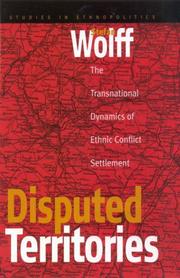
ISBN: 1571816577 9781571817182 1571815163 1785330586 9781571815163 9781785330582 Year: 2002 Publisher: New York ; Oxford, [England] : Berghahn Books,
Abstract | Keywords | Export | Availability | Bookmark
 Loading...
Loading...Choose an application
- Reference Manager
- EndNote
- RefWorks (Direct export to RefWorks)
Ethnic conflicts have shaped the 20th century in significant ways. While the legacy of the last century is primarily one of many unresolved conflicts, the author contends that Western Europe has a track record in containing and settling ethnic conflicts which provides valuable lessons for conflict management elsewhere. Focusing on ethno-territorial crossborder conflicts in Alsace, the Saarland, South Tyrol, and Northern Ireland, Andorra and the New Hebrides, the author develops a four-dimensional analytical framework that synthesizes the distinct factors that influence the complex relationship between host-state, kin-state, actors in the disputed territory, and in the international context.
Pluralism (Social sciences) --- -Nationalism --- -#SBIB:041.AANKOOP --- #SBIB:327.5H21 --- #SBIB:324H72 --- Consciousness, National --- Identity, National --- National consciousness --- National identity --- International relations --- Patriotism --- Political science --- Autonomy and independence movements --- Internationalism --- Political messianism --- Cultural diversity --- Diversity, Cultural --- Diversity, Religious --- Ethnic diversity --- Pluralism, Cultural --- Religious diversity --- Culture --- Cultural fusion --- Ethnicity --- Multiculturalism --- Vrede – oorlog, oorlogssituaties --- Politieke verandering: conflictlijnen, nationalisme/federalisme --- Europe --- Saarland (Germany) --- -Alsace (France) --- -Tyrol (Austria) --- -Northern Ireland --- Council of Europe countries --- Eastern Hemisphere --- Eurasia --- Boundaries. --- Historical geography. --- Boundaries --- Ethnic relations. --- Tirol (Austria) --- Tirolo (Austria) --- Osttirol (Austria) --- Région Alsace (France) --- Alsazia (France) --- Elsass (France) --- Alsatia (France) --- Alzacija (France) --- Alsace-Lorraine (Germany) --- Saar (Germany : State) --- Saar District (Germany) --- Saar Territory --- Saarpfalz (Germany) --- Westmark (Germany) --- Saar (Protectorate) --- Grand Est (France) --- G.N.I. --- GNI --- Irlande du Nord --- Kita Airurando --- Kitairurando --- Nordirland --- Norlin Airlann --- Pohjois-Irlanti --- Severna Irlandii︠a︡ --- Tuaisceart Éireann --- 北アイルランド --- Cultural pluralism --- Nationalism --- Diversité culturelle --- Nationalisme --- Alsace (France) --- Tyrol (Austria) --- Northern Ireland --- Sarre (Allemagne) --- Tyrol (Autriche) --- Frontières --- Géographie historique --- Relations interethniques --- -Europe
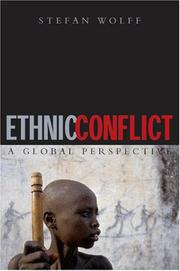
ISBN: 9780192805881 9780192805874 Year: 2011 Publisher: Oxford Oxford University Press
Abstract | Keywords | Export | Availability | Bookmark
 Loading...
Loading...Choose an application
- Reference Manager
- EndNote
- RefWorks (Direct export to RefWorks)
Ethnic conflict --- Ethnic relations --- Conflits ethniques --- Relations interethniques --- Political aspects --- Aspect politique --- etnische conflicten --- Sociology of minorities --- Polemology --- National movements --- 399.22 --- oorlogen --- vraagstukken over oorlog en vrede
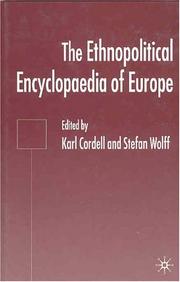
ISBN: 0333971248 Year: 2004 Publisher: Basingstoke Palgrave Macmillan
Abstract | Keywords | Export | Availability | Bookmark
 Loading...
Loading...Choose an application
- Reference Manager
- EndNote
- RefWorks (Direct export to RefWorks)
National movements --- Europe --- Political anthropology --- Political customs and rites --- Anthropologie politique --- Moeurs politiques --- Encyclopedias --- Encyclopedias. --- Encyclopédies --- Politics and government --- Politique et gouvernement --- Encyclopédies
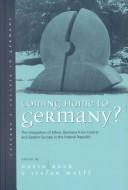
ISBN: 1571817182 1571817298 1782389822 Year: 2002 Volume: v. 4. Publisher: New York : Berghahn Books,
Abstract | Keywords | Export | Availability | Bookmark
 Loading...
Loading...Choose an application
- Reference Manager
- EndNote
- RefWorks (Direct export to RefWorks)
Return migration --- Germans --- Migration de retour --- Allemands --- History --- Congresses --- Histoire --- Congrès --- Germany --- Allemagne --- Ethnic relations --- Congresses. --- Relations interethniques --- Congrès
Book
ISBN: 1850656908 1850656916 Year: 2004 Publisher: London Hurst
Abstract | Keywords | Export | Availability | Bookmark
 Loading...
Loading...Choose an application
- Reference Manager
- EndNote
- RefWorks (Direct export to RefWorks)
Ethnic conflict. --- Conflict management. --- Conflits ethniques --- Gestion des conflits --- International movements --- Political sociology --- Law of nations: objects and subjects --- Human rights --- National movements --- Africa --- Asia --- Europe
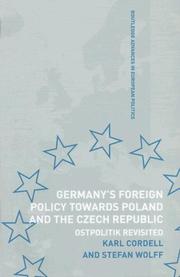
ISBN: 1134201362 1280177519 0203489195 0415369746 0415499577 Year: 2005 Publisher: London ; New York : Routledge,
Abstract | Keywords | Export | Availability | Bookmark
 Loading...
Loading...Choose an application
- Reference Manager
- EndNote
- RefWorks (Direct export to RefWorks)
This is a new exploration of how the events of the twentieth century still cast a shadow over relations between Germany, Poland and the Czech Republic.Using social constructivism theory, it provides a comparative assessment of Germany's post-reunification relations with the Czech Republic and Poland within the framework of the contemporary alliance structure. Identifying the key actors and factors, Cordell and Wolff examine the long-standing continuity in the norms and values that underpin German foreign policy and explore the issues of borders, territory, identities, minorities and po
Germany --- Foreign relations --- Weimar Republic --- Germanii︠a︡ --- Германия --- BRD --- FRN --- Jirmānīya --- جرمانيا --- Nimechchyna --- Gjermani --- Federalʹna Respublika Nimechchyny --- Veĭmarskai︠a︡ Respublika --- Ashkenaz --- Germanyah --- Bundesrepublik Deutschland --- Federal Republic of Germany --- Deutschland --- Repoblika Federalin'i Alemana --- República Federal de Alemania --- Alemania --- República de Alemania --- Bu̇gd Naĭramdakh German Uls --- Kholboony Bu̇gd Naĭramdakh German Uls --- KhBNGU --- ХБНГУ --- German Uls --- Germania --- Republika Federal Alemmana --- Deutsches Reich --- Grossdeutsches Reich --- Weimarer Republik --- Vācijā --- ドイツ --- Doitsu --- ドイツ連邦共和国 --- Doitsu Renpō Kyōwakoku --- Germany (Territory under Allied occupation, 1945-1955) --- Germany (Territory under Allied occupation, 1945-1955 : British Zone) --- Germany (Territory under Allied occupation, 1945-1955 : French Zone) --- Germany (Territory under Allied occupation, 1945-1955 : Russian Zone) --- Germany (Territory under Allied occupation, 1945-1955 : U.S. Zone) --- Germany (East) --- Germany (West) --- Holy Roman Empire --- ドイツ レンポウ キョウワコク --- Deguo --- 德国 --- Gėrman --- Герман Улс --- Politics & government --- Political structure & processes --- Diplomacy --- sudeten --- germans --- relations --- munich --- agreement --- minority --- government --- expellee --- organizations --- polish
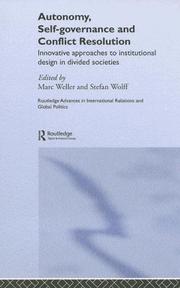
ISBN: 1134299087 1283241021 9786610231690 9786613241023 0203461916 9780203461914 9781283241021 9780415339865 0415339863 0415339863 9781134299089 9781134299034 1134299036 9781134299072 1134299079 9780415479592 0415479592 6610231699 6613241024 Year: 2005 Publisher: London ; New York : Routledge,
Abstract | Keywords | Export | Availability | Bookmark
 Loading...
Loading...Choose an application
- Reference Manager
- EndNote
- RefWorks (Direct export to RefWorks)
Conflicts over the rights of self-defined population groups to determine their own destiny within the boundaries of existing states are among the most violent forms of inter-communal conflict. Many experts agree that autonomy regimes are a useful framework within which competing claims to self-determination can be accommodated. This volume explores and analyses the different options available. The contributors assess the current state of the theory and practice of institutional design for the settlement of self-determination conflicts, and also compare and contrast detailed case studies on
Autonomy. --- Self-determination, National. --- Ethnic conflict --- Conflict management. --- Conflict control --- Conflict resolution --- Dispute settlement --- Management of conflict --- Managing conflict --- Management --- Negotiation --- Problem solving --- Social conflict --- Crisis management --- Conflict, Ethnic --- Ethnic violence --- Inter-ethnic conflict --- Interethnic conflict --- Ethnic relations --- National self-determination --- Nationalism --- Nation-state --- Nationalities, Principle of --- Sovereignty --- Independence --- Self-government --- International law --- Political science --- Political aspects. --- Autonomy --- Conflict management --- Self-determination, National --- #SBIB:324H72 --- #SBIB:327.5H20 --- #SBIB:327.7H201 --- Political aspects --- Politieke verandering: conflictlijnen, nationalisme/federalisme --- Vredesonderzoek: algemeen --- Europese Unie: politieke theorie --- Autonomie --- Droit des peuples à disposer d'eux-mêmes --- Conflits ethniques --- Gestion des conflits --- Aspect politique
Book
Year: 2005 Publisher: [Place of publication not identified] : Taylor & Francis,
Abstract | Keywords | Export | Availability | Bookmark
 Loading...
Loading...Choose an application
- Reference Manager
- EndNote
- RefWorks (Direct export to RefWorks)
This is a new exploration of how the events of the twentieth century still cast a shadow over relations between Germany, Poland and the Czech Republic. Using social constructivism theory, it provides a comparative assessment of Germany's post-reunification relations with the Czech Republic and Poland within the framework of the contemporary alliance structure. Identifying the key actors and factors, Cordell and Wolff examine the long-standing continuity in the norms and values that underpin German foreign policy and explore the issues of borders, territory, identities, minorities and population transfers. Paying particular attention to the process of European integration and the role of the new Germany within Europe, the authors identify how new possibilities for co-operation might finally overcome legacies of the past. This pioneering study will be of particular interest to students of European politics and international studies.
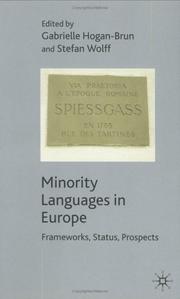
ISBN: 1403903964 Year: 2003 Publisher: Houndmills ; Basingstoke ; New York Palgrave Macmillan
Abstract | Keywords | Export | Availability | Bookmark
 Loading...
Loading...Choose an application
- Reference Manager
- EndNote
- RefWorks (Direct export to RefWorks)
Sociolinguistics --- Europe --- Linguistic minorities --- Language policy --- Minorités linguistiques --- Politique linguistique --- #SBIB:35H436 --- #SBIB:327.7H231 --- #SBIB:043.IOS --- #A0312A --- 641 Taalbeleid --- EEU / Central & Eastern Europe --- 347.91 --- 323.1 --- Beleidssectoren: welzijn, volksgezondheid en cultuur --- Europese Unie: sociaal-economisch beleid, landbouw-, milieu-, cultuur- en communicatiebeleid --- Burgerlijke rechtsvordering. --- Taalgebruik. Vragen rond nationaliteit, ras en taal. --- Minorités linguistiques --- Burgerlijke rechtsvordering --- Taalgebruik. Vragen rond nationaliteit, ras en taal
Book
ISBN: 9781137031235 9780230203853 023020385X 1349301558 9786612915888 0230292283 1282915886 1137031239 Year: 2012 Publisher: Basingstoke: Palgrave MacMillan,
Abstract | Keywords | Export | Availability | Bookmark
 Loading...
Loading...Choose an application
- Reference Manager
- EndNote
- RefWorks (Direct export to RefWorks)
In implementing the European Neighbourhood Policy (ENP) the European Union offers a deeper political and economic relationship to its neighbours - but without a promise of EU membership. The ENP is intended to be a strategic approach to the post-enlargement situation which redraws boundaries between the EU 'insiders' and the 'outsiders' on the EU's borders. This volume presents an empirical exploration of the ENP, in which the main emphasis is on an assessment of the impact the ENP has had so far and the factors that have shaped its implementation since 2003. The volume also provides a perspective on how to study this relatively new policy area. It contends that the ENP represents a distinctive challenge for scholars studying the European Union and that the development of a structured relationship that embraces neighbouring states represents a 'coming of age' for the Union.
European Union --- European Union countries --- Foreign relations --- #SBIB:327.7H233 --- Europese Unie: externe relaties, buitenlands- en defensiebeleid (ook WEU) --- Foreign relations. --- #SBIB:327.7H233Europese Unie: externe relaties, buitenlands- en defensiebeleid (ook WEU)European Union countriesForeign relations. --- E.U. --- International relations. Foreign policy --- Pays de l'Union européenne --- Relations extérieures --- European Union countries - Foreign relations
| Listing 1 - 10 of 10 |
Sort by
|

 Search
Search Feedback
Feedback About UniCat
About UniCat  Help
Help News
News